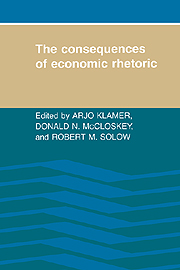Book contents
- Frontmatter
- Contents
- Preface
- The consequences of economic rhetoric
- PART I ECONOMIC RHETORIC: INTRODUCTION AND COMMENTS
- PART II ECONOMIC RHETORIC: FURTHER ARGUMENTS
- PART III ECONOMIC RHETORIC AMONG ECONOMISTS
- 9 Shall I compare thee to a Minkowski–Ricardo–Leontief–Metzler matrix of the Mosak–Hicks type? Or, rhetoric, mathematics, and the nature of neoclassical economic theory
- 10 On the brittleness of the orange equilibrium
- 11 The significance of significance: Rhetorical aspects of statistical hypothesis testing in economics
- 12 The rhetoric of self-interest: Ideology of gender in economic theory
- PART IV ECONOMIC RHETORIC IN POLITICS AND JOURNALISM
- PART V ECONOMIC RHETORIC: ITS RHETORIC AND ITS CONSEQUENCES
- 1 Appendix: Other contributors and participants
- Index
9 - Shall I compare thee to a Minkowski–Ricardo–Leontief–Metzler matrix of the Mosak–Hicks type? Or, rhetoric, mathematics, and the nature of neoclassical economic theory
Published online by Cambridge University Press: 07 September 2010
- Frontmatter
- Contents
- Preface
- The consequences of economic rhetoric
- PART I ECONOMIC RHETORIC: INTRODUCTION AND COMMENTS
- PART II ECONOMIC RHETORIC: FURTHER ARGUMENTS
- PART III ECONOMIC RHETORIC AMONG ECONOMISTS
- 9 Shall I compare thee to a Minkowski–Ricardo–Leontief–Metzler matrix of the Mosak–Hicks type? Or, rhetoric, mathematics, and the nature of neoclassical economic theory
- 10 On the brittleness of the orange equilibrium
- 11 The significance of significance: Rhetorical aspects of statistical hypothesis testing in economics
- 12 The rhetoric of self-interest: Ideology of gender in economic theory
- PART IV ECONOMIC RHETORIC IN POLITICS AND JOURNALISM
- PART V ECONOMIC RHETORIC: ITS RHETORIC AND ITS CONSEQUENCES
- 1 Appendix: Other contributors and participants
- Index
Summary
They have endeavor'd, to separate the knowledge of Nature, from the colours of Rhetorick. …
– Thomas Sprat, History of the Royal SocietyThe greatest thing by far is to have a command of metaphor.
– Aristotle, PoeticsEasy Rider
Is rhetoric just a new and trendy way to épater les bourgeois? Unfortunately, I think that the newfound interest of some economists in rhetoric, and particularly Donald McCloskey in his new book and subsequent responses to critics (McCloskey 1985a; 1985b), gives that impression. After economists have worked so hard for the past five decades to learn their sums, differential calculus, real analysis, and topology, it is a fair bet that one could easily hector them about their woeful ignorance of the conjugation of Latin verbs or Aristotle's six elements of tragedy.1 Moreover, it has certainly become an academic cliche that economists write as gracefully and felicitously as a hundred monkeys chained to broken typewriters. The fact that economists still trot out Keynes's prose in their defense is itself an index of the inarticulate desperation of an inarticulate profession.
There is nothing new in all of this: The average economist knows it in his or her bones. Hence the exasperation that must greet a passage like that found in McCloskey (1985a: 29): “ … the overlapping conversations provide the standards. It is a market argument. There is no need for philosophical lawmaking or methodological regulation to keep the economy of the intellect running just fine.” Isn't this just what the average neoclassical economist believed anyway? So what else is new?
- Type
- Chapter
- Information
- The Consequences of Economic Rhetoric , pp. 117 - 145Publisher: Cambridge University PressPrint publication year: 1989
- 2
- Cited by



